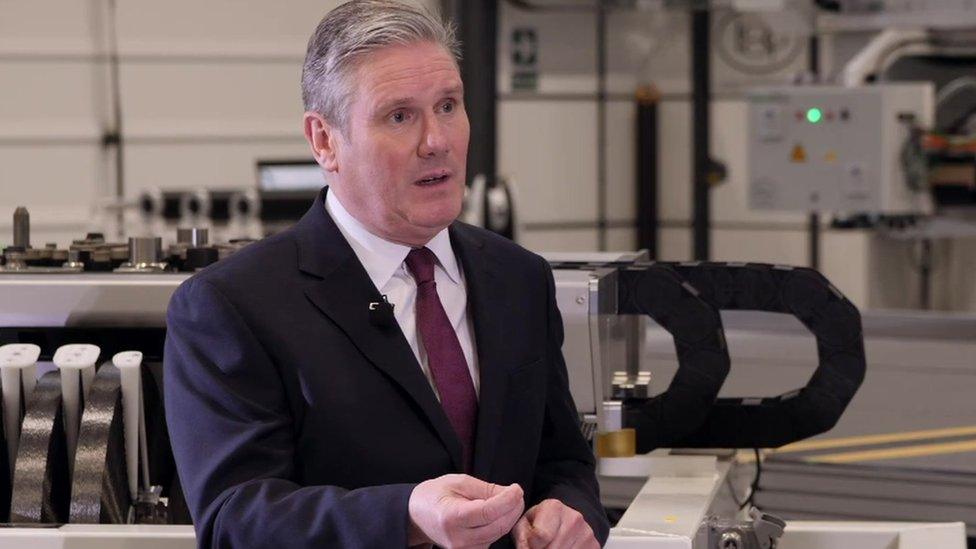Politicians primed for change in the year ahead
- Published
- comments
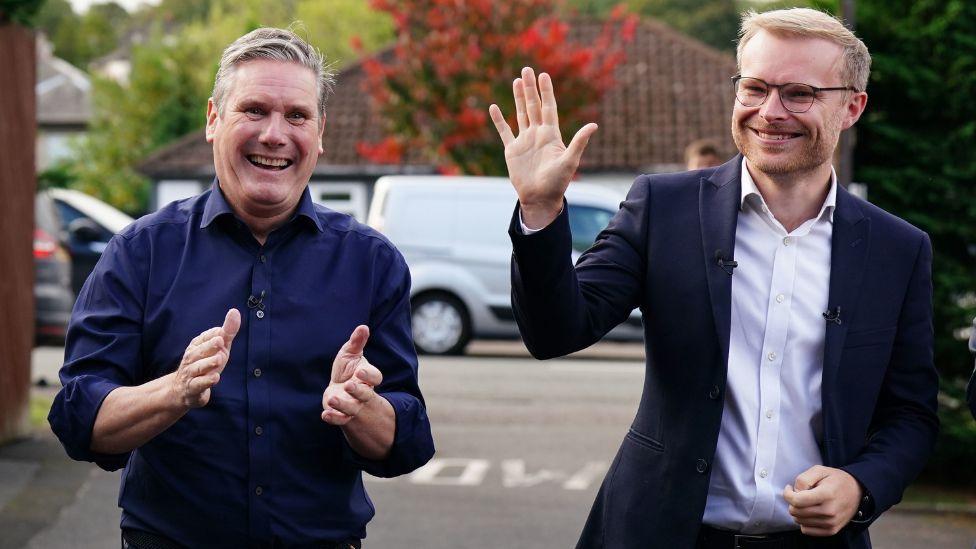
Labour leader Sir Keir Starmer and Scottish MP Michael Shanks are hoping to see a resurgence for their party this year
A Conservative government in turmoil, riven by internal differences - leading to a Labour government and a new prime minister.
This was Britain, 100 years ago.
After an inconclusive election in 1923, the King appointed the Scot Ramsay MacDonald as the first ever Labour prime minister in January 1924.
You never know what's going to happen in politics - and it's the same for us this year.
One thing is for sure - we will be going to the polls in a UK general election.
The prime minister has said a vote is likely in the "second half of the year". That's his "working assumption", at least.
There is wriggle room there and it could always be a ploy to catch the other parties off-guard and go early - but that seems unlikely.
A spring election under warmer weather with Euro 2024 on the cards might have meant a more optimistic and happier electorate.
But by going later, it gives the green shoots of the economy longer to take hold and also gives more time for the PM's Labour opponent, Sir Keir Starmer, to potentially trip up.
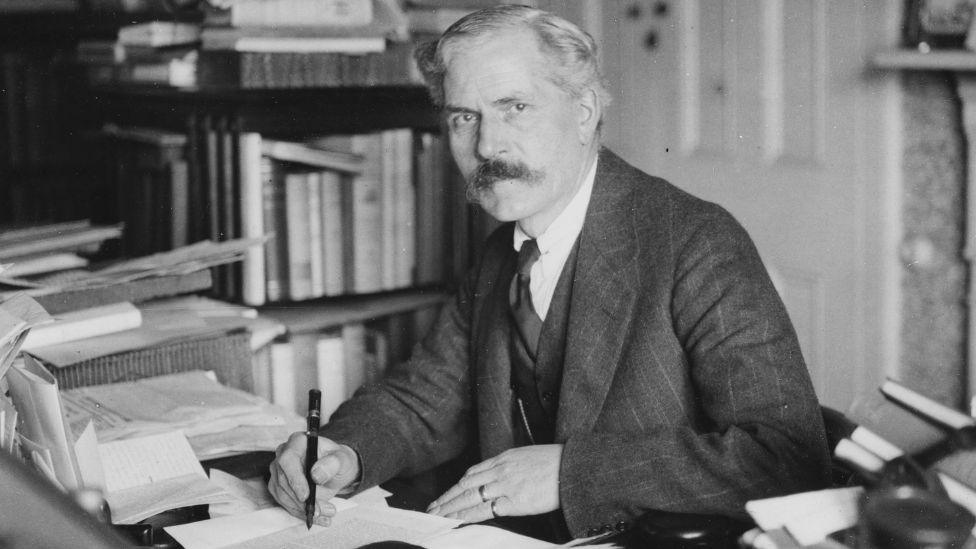
Ramsay MacDonald became the first Labour prime minister in 1924
With the ballot boxes being made ready in 2024, that means the Scottish Labour MP Michael Shanks is hoping to be re-elected, after winning the Rutherglen and Hamilton West by-election last October.
I caught up with him outside the Rutherglen Town Hall.
Time for a change, he said. Both Labour (and the SNP) say they would have preferred an earlier election.
But 100 years on from that first Labour government, Mr Shanks said the polls predict their chances are good but they are taking nothing for granted.
'Out of touch'
He said the party "represents the power of working people at the heart of government again" and not the "corrupt, out of touch Conservatives - but a government focused on making working people's lives better".
On the potential for Labour tripping up, he said the Tories have been tripping up themselves left, right and centre over the past few years.
Nearby, at the People's Palace in the east end of Glasgow, we catch up with the SNP MP David Linden, who is hoping the good folk of the east of the city lend him their vote.
In seats across the central belt, it's a clear SNP-Labour fight.
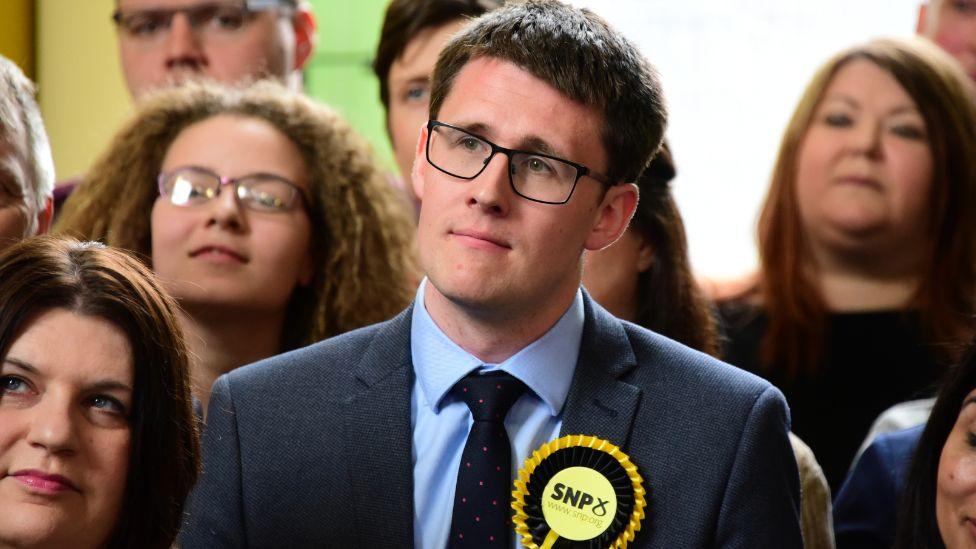
David Linden is urging voters to back independence and the SNP
The SNP say in fact it's "no change" from Sir Keir Starmer and what they call his "pro-Brexit Labour party".
Mr Linden said it's inevitable the Tories will be removed from power - but the choice is whether they are removed for four years or forever with independence, via a vote for the SNP.
Polls come and go, he added. Mr Linden pointed out in 2011 the polls suggested in January they would lose but the SNP had a historic victory at Holyrood.
He admitted 2023 was a challenging year for the SNP - but they go into the new year with fresh optimism.
Operation Branchform
The party wants to move on - but "Operation Branchform" - the police investigation into the SNP's finances - continues.
It is still a story at the forefront of many minds and the latest speculation is endlessly discussed by politicians and journalists.
And it is just speculation. No-one except the police detectives at the heart of this and senior Crown Office officials know what might happen.
Opponents have relished the SNP's discomfort.
Despite all the turmoil at Westminster and glummer faces on the ladies and gentlemen representing the shires of England, the Scottish Conservatives claim to be optimistic about taking on the SNP, particularly in the north-east of the country and down Angus way.
Meghan Gallacher, the deputy leader of the Scottish Tories, told BBC Scotland News they want to focus on people's priorities and will be ready when the actual date is finally announced.
Hoping to finally disentangle themselves from the Conservatives (after the 2010-2015 coalition) and scamper clear, the Liberal Democrats may be small in number but appear to be nimble.
The Scottish leader Alex Cole-Hamilton told BBC Scotland News they have shown in "massive by-election victories" that they are ready to make an impact in "massive parts of Britain" with a message of "hope and change" and that they are "smashing it".
Bigger than the LibDems at Holyrood but with no Westminster MPs, the co-leader of the Scottish Greens Patrick Harvie cycles in to the BBC at Pacific Quay.
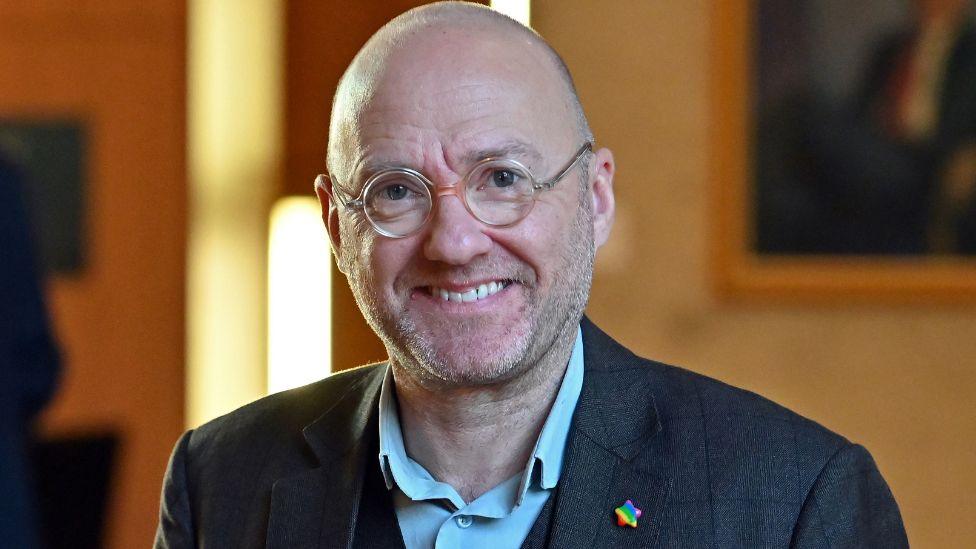
Scottish Greens co-leader Patrick Harvie says he would prefer an election in early 2024
He told me he too is frustrated by the perceived "delay" to an autumn election by the prime minister.
It is up to branches if they want to stand in constituencies - emphasising it is a really local decision and denying it is anything to do with giving the SNP an easy ride.
If there is a change at the top of the SNP after a bruising election, Mr Harvie would not be drawn on what that could mean to the Bute House Agreement - which puts the Greens in government with the SNP.
It is a partnership backed by First Minster Humza Yousaf but not by his former leadership challenger, Kate Forbes.
There are many things that could happen between now and the autumn. Remember, there are boundary changes too which makes seats that bit more unpredictable.
Poll leads can come and go and our politicians have also mentioned the international situation - with global conflict having a bearing on the UK economy.
In 1924, there was a political revolution with that Labour government. That was a first.
We might not see revolutionary change like that - but we will see change at home and abroad.
- Published4 January 2024
